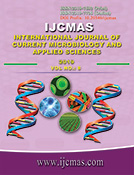


 National Academy of Agricultural Sciences (NAAS)
National Academy of Agricultural Sciences (NAAS)

|
PRINT ISSN : 2319-7692
Online ISSN : 2319-7706 Issues : 12 per year Publisher : Excellent Publishers Email : editorijcmas@gmail.com / submit@ijcmas.com Editor-in-chief: Dr.M.Prakash Index Copernicus ICV 2018: 95.39 NAAS RATING 2020: 5.38 |
Berseem, a nitrogen-fixing, annual, multicut forage crop cultivated around 2 million hectares areas of northern, central and eastern parts of India. Berseem has variability for pollination behavior however variation for morphological and agronomic traits are scare, perhaps, because of initially introduction of crop with narrow genetic base. Genetic variability have been fortified through introduction of exotic materials, intra-interspecific hybridization, induction of polyploidy and mutation. ICAR-Indian Grassland and Fodder Research Institute maintain >900 accessions of Trifolium spp. Different genetic improvement programmes in India resulted with development of >15 cultivars apart from unique agro-morphological variants. Affinity of Berseem was tested with other species and suitable donors for introgression of genes especially for biotic stress were identified. By adopting embryo rescue technique, wide crosses of Berseem with T. constantinopolitanum, T. apertum, T. resupitanum and T. vessiculosum successfully developed and genes for biotic stresses and agro-morphological traits were incorporated. Longer duration, an important agronomic trait in Indian condition, has been induced through induction of mutation by physical mutagens. Induction of autopolyploidy by using coltchicine treatment made major breakthrough in berseem breeding in India by the development of high biomass producing cultivars. The future breeding strategies contemplate to intensification of gene pool through exotics from the centre of origin, increase of variability, development of genomic resources, development of inbreds, remodeling of breeding procedure as substantial points.
 |
 |
 |
 |
 |